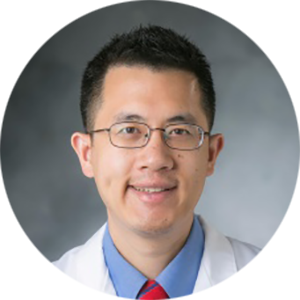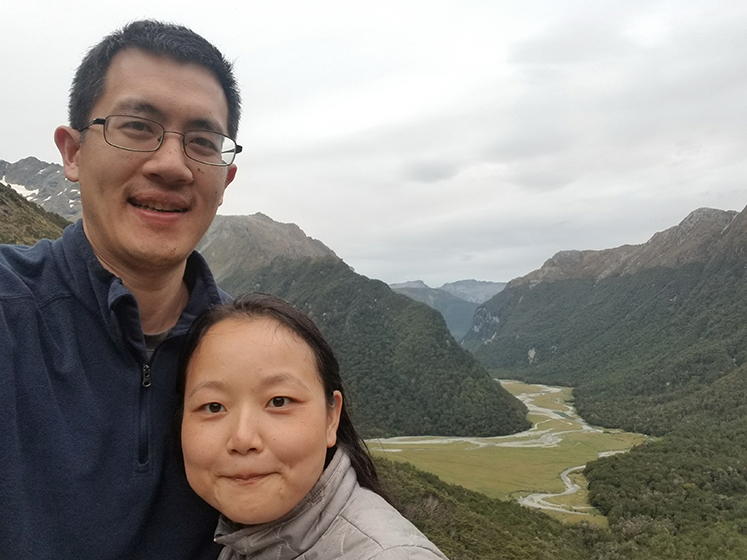
This week’s Faculty Spotlight shines on pediatric infectious diseases physician Yeh-Chung “Daniel” Chang, MD. Chang talks to us about how he first became interested in becoming a pediatrician from a very young age, and specifically, infectious diseases during medical school and his pediatric residency; his interest in viral infections in pediatric transplant patients and in vaccine responses and the development of antifungals for this population; and the significance of his most important mentor, Dr. Bill Steinbach.
How long have you been at Duke? How did you decide to come here?
I have been at Duke for almost four years now. I came for the opportunity to help start up a Pediatric Transplant Infectious Diseases (ID) service here.
What are your current responsibilities within the Department of Pediatrics? What does your typical day look like?
I am mostly clinical, so half of the time, I attend the inpatient Pediatric Transplant ID service, and the other half of the time, I cover outpatient clinics and do research. On my inpatient days, my fellow and I join multidisciplinary rounds with various transplant teams. Then, in the late morning or early afternoon, I round with the fellow and then I go see the patients and their families. I like the earlier multidisciplinary rounds because it highlights the role of teamwork and direct communication, and I enjoy the later rounds because it gives us time to look up the latest literature, and I can do a little more teaching. On the outpatient weeks, I have a few half-day clinics. Some of the clinics are embedded within other transplant clinics, where I do pre-transplant evaluations, help with vaccine recommendations, and counsel regarding safe strategies for living after transplant. Lately, there have been a lot of questions regarding COVID or the COVID vaccine, so I chat with a lot of pediatric transplant patients and their families regarding these issues as well.
How and when did you initially become interested in medicine? What made you decide to pursue a career in pediatric infectious diseases in particular?
I loved going to the pediatrician as a child. It seemed like I just knew I wanted to be a pediatrician from a young age. During medical school and pediatric residency, I got involved in infectious diseases. I love everything from the hard-to-pronounce names of organisms and antibiotics to the fact that infections are usually treatable or preventable. It makes me feel like I am making a true difference in the care of these patients and their families.
What do you see as the biggest current challenges and opportunities in the field of pediatric infectious diseases?
I think one challenge is still getting trainees to be interested in pediatric infectious diseases. The field is changing so much, and there are increasing opportunities in transplant infectious diseases, antimicrobial stewardship, and infection prevention and control. I think another challenge is to get young physician scientists up and going. Even though I am mostly clinical, I value the research that many of my colleagues are doing, and we always need new approaches to treatment. Lastly, the coronavirus pandemic has illustrated why it is so important to have infectious diseases specialists and strong public health programs. Infectious diseases adapt, and we are always learning more about new pathogens.
Is there any research or other special projects you are doing or plan on doing?
My specific areas of interest are viral infections in pediatric transplant patients, specifically Epstein-Barr Virus (EBV) and its link to post transplant proliferative disorder (PTLD). I am also very interested in vaccine responses in transplant patients, and the development of antifungals for this population.
What do you enjoy most about your work?
I love the people I work with, both within the Division of Pediatric Infectious Diseases, as well as my colleagues and coworkers on the transplant teams. I see pediatric transplant very much as a multidisciplinary program, and love the opportunities to collaborate clinically across specialties, as well as through research.
Who was your most significant mentor and what knowledge did you gain through this collaboration?
I have had many mentors during my training, including my residency program director, Dr. Jeff McKinney (UT Southwestern), my fellowship mentor, Dr. Kristen Feemster (Children’s Hospital of Philadelphia or CHOP), and my fellowship program director, Dr. Brian Fisher (CHOP). However, I would say that the mentor who has assisted me the most for my early career has been Dr. Bill Steinbach, here at Duke. He really understands the balance between pushing me to always further my research and providing the right amount of support.
Do you have any advice for trainees?
Do what you love. It makes the day-to-day tasks more meaningful and helps when there are struggles. Find great mentors. This will help you immensely as you develop your career.
What passions or hobbies do you have outside of Duke?
I love to hike and travel. I’ve been to all 50 states, numerous national parks, but the most memorable trip I took was my honeymoon to New Zealand, when my wife and I took a week to do some awesome treks. The picture seen here is close to a scenic overlook by the Routeburn Falls, and there’s a lodge there where you can stare out at the scenery right before you sleep and when you wake up.
